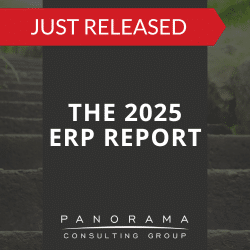- Evaluating emerging software categories requires aligning solutions with organizational goals, ensuring they address both current and future business needs.
- Compatibility with existing ERP systems, scalability, and vendor stability are critical factors in assessing technologies like AI, blockchain, and IoT.
- Data quality, governance frameworks, and integration readiness significantly impact the success of decision intelligence and IoT-enhanced ERP systems.
- Addressing challenges such as data standardization, security, and device compatibility is crucial for seamless adoption of IoT and blockchain technologies.
- A thorough evaluation of emerging software can enhance efficiency, improve data insights, and support long-term business growth.
When it comes to selecting an ERP system, the process is inherently complex. With the rise of new and emerging technologies, this decision has become even more intricate.
Blockchain solutions, decision intelligence platforms, and other advanced applications are reshaping the technology landscape, offering significant benefits to those willing to embrace innovation. But how do you evaluate these tools effectively while ensuring they align with your existing ERP system?
Today, we’re exploring the nuanced process of evaluating emerging software. This guide will help you make confident decisions that position your business for future success.
The 2025 Top 10 ERP Systems Report
What vendors are you considering for your ERP implementation? This list is a helpful starting point.
Understanding the Value of Emerging Software in ERP
The ERP market has long been dominated by traditional software vendors, but the increasing influence of emerging technologies is undeniable. These tools bring new risks but also promise to improve efficiency, enhance data insights, and enable better decision-making.
Here are some examples:
Decision Intelligence Software
Decision intelligence software is a burgeoning technology designed to translate complex data into actionable insights. Unlike standard analytics tools, these platforms simulate decision-making processes, incorporating predictive modeling and machine learning.
For CEOs, the allure is clear: imagine reducing operational blind spots and preemptively identifying supply chain risks, while improving resource allocation across departments.
However, understanding the limitations of decision intelligence software is just as crucial. These systems rely on data quality and completeness to produce accurate and contextually relevant recommendations. Additionally, decision intelligence tools might not be suitable for complex, unstructured problems that fall outside the scope of their training models.
Expert Tip
When evaluating decision intelligence software, ensure the software can accommodate any gaps or inconsistencies in your datasets without compromising the accuracy of its recommendations. Additionally, prioritize tools that are well-suited to the specific types of business challenges your organization faces. Focus on solutions that offer not just predictive insights but actionable, prescriptive recommendations that align with your existing ERP analytics.
Blockchain in ERP
Blockchain technology is no longer limited to cryptocurrencies; its use in ERP systems is growing, particularly for applications in supply chain management, compliance tracking, and financial transparency.
Blockchain offers increased security, tamper-proof records, and real-time transaction verification.
Yet, its value hinges on context.
For instance, blockchain is most transformative in the context of industries like pharmaceuticals or logistics, where traceability and compliance are paramount. However, in less regulated environments, the operational complexities of implementing blockchain may outweigh its benefits.
Expert Tip
In a blockchain software evaluation, we recommend looking for vendors that provide ERP-native integrations to enhance system-wide efficiency. Additionally, focus on scalability and long-term sustainability, ensuring the technology can grow with your business while remaining cost-effective and energy-efficient. Even in less regulated industries, blockchain may unlock value by optimizing workflows and improving data accuracy.
Artificial Intelligence (AI) in ERP Systems
AI is revolutionizing ERP systems with capabilities like natural language processing, predictive analytics, and automated workflows. It’s particularly effective in areas like demand forecasting, fraud detection, and employee performance management.
Our ERP advisory team has found AI-driven tools particularly effective in reducing companies’ administrative burden by automating repetitive tasks, such as invoice processing and employee scheduling.
However, overreliance on AI comes with risks, especially if the underlying algorithms are flawed or biased. Moreover, integrating AI into legacy ERP systems may not be feasible without extensive customization.
Expert Tip
When evaluating AI software, prioritize solutions that provide detailed audit trails and explainable models, allowing you to understand how the software reaches its conclusions. Additionally, look for vendors that provide ready-made integration options tailored to your ERP system, such as plug-and-play connectors or APIs that eliminate the need for extensive coding or system reconfiguration. These solutions streamline the setup process by enabling quick data mapping and seamless workflow integration.
Low-Code/No-Code Platforms
Low-code/no-code platforms are becoming indispensable in ERP environments, empowering non-technical users to build custom workflows and applications. These tools reduce development time, allowing businesses to quickly adapt to changing requirements without relying heavily on IT resources.
However, their simplicity can be a double-edged sword, potentially leading to a proliferation of poorly designed processes or security vulnerabilities.
Expert Tip
Focus on low-code/no-code platforms that offer governance features, such as centralized oversight and approval workflows. Look for tools that allow IT teams to monitor and manage user-created applications to ensure they align with organizational standards and security protocols.
IoT-Integrated ERP Systems
The Internet of Things (IoT) is redefining ERP by connecting physical assets to digital systems, enabling real-time data collection and analysis. In industries like manufacturing, logistics, and retail, IoT-enhanced ERP systems can improve asset tracking, predictive maintenance, and supply chain visibility.
However, integrating IoT into ERP requires careful consideration of infrastructure, data volume, and security. Additionally, companies must address challenges around data standardization and device compatibility.
Expert Tip
Choose a solution that can standardize data from various IoT devices and ensure compatibility across different hardware and software platforms to avoid integration issues. In addition, you should ensure the system can manage large amounts of data quickly and efficiently without slowing down overall performance. Consider some of the systems in our top ERP systems list.
Best Practices for Evaluating Emerging Software
1. Define Clear Evaluation Criteria
The excitement surrounding new technology can overshadow strategic needs.
Enterprise software impacts multiple parts of an organization, from operations to sales to finance. Establishing a cross-functional evaluation team can help you ensure that the software addresses each department’s needs.
Other considerations include:
- Business Value: How will this software contribute to revenue growth, cost reduction, or risk mitigation?
- Scalability: Can the solution grow with our organization over the next five to ten years?
- Compliance: Does the software meet regulatory and industry-specific requirements?
- Vendor Stability: Is the vendor financially sound, and do they have a proven track record of investing in research and development? Do they have the resources and longevity to support your system over time?
2. Pilot Emerging Technologies Before Full Implementation
Conducting pilot projects allows you to test software in a controlled environment. This minimizes risk while offering real-world insights into usability, integration, and ROI.
For example, when evaluating AI tools for inventory management, you might pilot the solution in a single warehouse before rolling it out across all facilities. During this phase, you could gather feedback, identify challenges, and refine implementation strategies.
3. Emphasize Data Integrity and Security
Emerging technologies often process vast amounts of sensitive data. Blockchain and AI, in particular, rely on large volumes of accurate datasets to deliver value.
Data integrity issues can significantly diminish software performance and introduce compliance risks.
We recommend conducting a comprehensive data audit to identify issues, such as duplicate records and inconsistent formats, before integrating emerging software into your ERP system. Additionally, ensure your data governance framework includes clearly defined ownership, standardized processes for data quality management, and mechanisms for ongoing monitoring.
Learn More About Emerging Software Evaluation
By adopting a strategic, methodical approach to emerging software evaluation, organizations can maximize the benefits of these tools while minimizing risks.
Our independent ERP consultants can help you align emerging technologies with your broader organizational goals to ensure a smooth transition and long-term value. Contact us below for a free ERP consultation.













